눈길 접촉 사랑
Eye contact love
눈길 접촉 사랑, Eye contact love
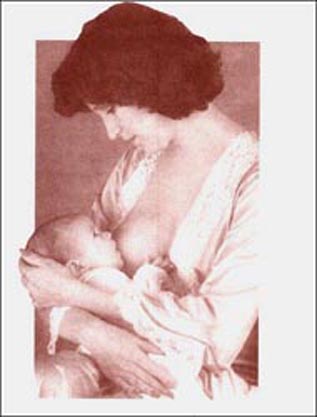
사진 27. 갓 난 신생아는 엄마의 눈길 접촉 사랑을 받고 또 자기의 눈길 접촉 사랑을 엄마에게 준다.
출처- Mead Johnson Nutritionals, USA와 소아가정간호 백과
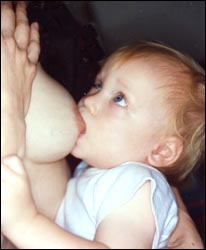
사진 28. 엄마가 모유를 아기에게 먹이는 동안 아기는 엄마로부터 눈길 접촉사랑을 받고 엄마는 아기로부터 눈길 접촉사랑을 받는다. 이렇게 모자 간 서로 눈길접촉으로 사랑을 주고받으면서 모자간 사랑 반딩(Bonding)이 굳건히 형성된다.
Copyright ⓒ 2011 John Sangwon Lee, MD., FAAP
- “눈이 맞는다, 눈이 맞아서, 눈 맞춤, 눈길”이란 말들이 있다.
- 이런 말들을 아이 콘택트(Eye contact)란 말로 표현할 수 있다.
- Eye contact love(아이 콘택트 러브)란 말도 있다.
- 그 말을 “눈길 접촉 사랑”, 눈길 사랑, 눈웃음 사랑, 또는 “눈 맞춤 사랑 “이라고 표현할 수 있다.
- 부모 자식 간의 관계에서, 부부 간의 관계에서, 친구간의 관계에서, 또는 사랑하는 애인 간의 관계에서 사랑을 주고받을 때도 항상 눈길을 이용한다. 즉 눈길 접촉 사랑을 이용한다.
- 특히 대화를 통해 상호간 의사소통을 할 때도 눈길을 이용한다. 알게 모르게 눈길접촉을 많이 이용한다.
- 또 그 외 모든 인간관계에서도 눈길 접촉을 알게 모르게 많이 이용한다.
- 특히 부모들이 자녀들을 사랑으로 훈련시킬 때도 눈길을 이용할 수 있고, 양육하는 동안 부모들은 눈길 접촉을 이용해서 조건 없고 진정한 사랑을 자녀들에게 전달한다.
- 부모들은 눈길 접촉을 이용해서 자녀들을 올바르게 훈련시키고 그들에게 희로애락을 전달하는 수단으로 눈길 접촉을 이용하면서 일상생활을 한다.
- 이와 같이 일상생활을 하는 동안 부모와 자녀 간 또는 부모 이외와 자녀 간 서로 눈길 접촉을 알게 모르게 많이 이용한다.
- 특히 부모가 자녀와 대화를 통해 의사소통을 할 때 서로 눈길 접촉을 많이 이용한다.
- 아기가 태어난 후 엄마가 사랑스러운 눈길로 갓 태어난 머리에서부터 발끝까지 아기를 살펴본다.
- 바로 이 때 갓난아기가 두 눈을 활짝 뜨고 엄마로부터 눈길 접촉사랑을 받기 시작한다.
- 그 아기는 엄마의 눈길 접촉사랑을 받아 자기의 사랑 탱크 속에 담는다.
- 바로 그때 처음 받은 엄마의 눈길 접촉사랑이 그 자녀의 삶의 자양분과 활력소로 사용된다.
- 그런데도 이런 눈길 접촉사랑은 얼마나 중요한지 잘 모르는 부모들이 많이 있다. 이렇게 사랑하는 엄마와 갓난아기 사이에 눈길 접촉사랑을 알게 모르게 주고받는다.
- 즉 부모 자녀 간 눈길 접촉사랑이 이렇게 시작되고 계속 된다.
- 엄마의 젖을 먹는 아기들을 잘 살펴보자.
- 의학 문헌에서 찾아볼 수 없는 많은 모자간 사랑을 주고받는 방법을 그때 배울 수 있다.
- 젖 먹는 아기가 젖을 먹는 것 이외 엄마의 눈길 접촉사랑을 받기 위해서 엄마의 두 눈을 뚫어지게 쳐다보면서 젖을 먹는다.
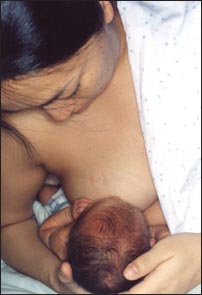
사진 29. 모유수유를 하면서 눈길 접촉으로 사랑한다.
Copyright ⓒ 2012 John Sangwon Lee, MD., FAAP
- 젖 먹는 아기들은 엄마의 젖을 빨아먹고 그 젖에서 나온 영양분으로 성장하고 발육하는 것은 물론이다.
- 그 이외 엄마의 눈길을 통해 받는 엄마의 눈길 접촉사랑, 엄마에게 안기고 엄마의 따뜻한 신체를 접촉하면서 젖꼭지를 빨아 먹는 동안 받는 엄마로부터 받는 신체적 접촉 사랑은 모유에서 얻는 영양분 이상으로 아기에게 상당히 중요한 사랑의 자양분이다.
- 엄마의 뇌하수체 후엽에서 옥시토신 호르몬이 쏟아져 나올 때 엄마는 젖 먹는 아기를 폭신 끼어 않게 된다.
- 그래서 옥시토신 호르몬을 사랑 호르몬이라고 한다. 옥시토신 호르몬은 모유 분비관계를 수축 시켜 젖이 잘 나오게 하고 부만 후 자궁을 수축 시키는 역할도 한다.
- 엄마의 젖을 먹는 아기는 엄마로부터 눈길 접촉사랑과 신체적 접촉사랑을 충분히 받아 그 사랑을 그의 사랑 탱크 속에 담는다.
- 엄마의 젖에서 얻는 총칼로리와 영양분보다 더 많은 영양분이 그 사랑 속에 들어있다.
- 이런 이유로 모유수유를 하는 엄마가 더 행복하고 엄마의 젖을 먹는 아기들은 더 건강하게 더 잘 성장 발육하고 더 행복하다.
- 이런 글을 읽은 적이 있다.
- 의과 대학생들에게 모유수유의 좋은 점은 무엇인가 질문했다. “모유는 자연식”이다. 모유의 온도는 아기가 먹기에 알맞고 일정하다. 모유는 이 세상에서 가장 아름다운 그릇에 담겨 있고 그 그릇은 아무리 주물러도 찌그러지지 않고 깨지지도 않아서 참 좋다”가 의과 대학생들의 답이었다.
- 위의 모든 답변은 다 옳고 그럴듯하다. 그 외로 더 많은 답이 있다.
- 모유의 가장 좋은 장점은 모유를 수유하는 동안 엄마의 눈길 접촉 사랑을, 엄마의 신체적 접촉 사랑을 아기에게 온전히 전달할 수 있고, 거기에서 젖 먹는 아기는 엄마로부터 조건 없는 진정한 사랑을 받고 있다고 느끼는 것이다.
- 젖 먹는 아기는 가진 것이 많이 있지 않다.
- 그렇지만 아기는 엄마로부터 받은 사랑을 자기의 사랑 탱크 속에 저장한다.
- 젖을 먹는 동안 엄마로부터 받은 사랑을 아기는 자기의 사랑의 탱크 속에 저장한다.
- 사랑 탱크 속에 저장했던 눈길 접촉 사랑과 신체적 접촉 사랑을 엄마에게 되돌려 주면서 젖을 먹는다.
- 엄마로부터 받은 눈길 접촉사랑과 신체적 접촉사랑이 없으면 엄마에게 되돌려줄 사랑이 없다.
- 모유를 수유 하는 동안 모자간 사랑 반딩(Bonding)이 더 굳건히 형성된다.
- 이 방법 이외 다른 어떤 수단으로 모자간 사랑의 반딩(결속)을 더 굳건히 형성할 수 있을까.
- “모유를 수유하는 중 모자간 사랑 반딩이 형성된다.”란 답변이 의과대학생들의 질의응답에 꼭 있었으면 더 좋았을 것이다.
- 오늘날 많은 경우, 부모 자녀 간에 사랑 반딩이 허술하게 결속되어 있다. 때로는 사랑 반딩이 조금도 형성 되어 있지 않다.
- 여러 가지 이유가 있겠지만 엄마가 아기에게 젖을 먹이지 않는 것아 제일가는 이유라고 저자는 생각한다. 또 젖을 적절한 기간 동안 먹이지 않고 자녀들을 양육한데서 온다고 생각도 해봤다. 아기가 갓 태어 난 당시 모자간 사랑 반딩을 제대로 해주지 않은 것도 이유일 수 있다.
- 소아 정신과 의사 Ross Campbell 박사 저 “How to really love your child”와 “How to really love your teenager”는 저자가 좋아하는 자녀양육 지침서이다.
- 그의 저서에서, 모든 아이들은 사랑과 감정을 저장할 수 있는 감정 탱크(Emotional tank)를 가지고 태어난다고 했다.
- 저자는 감정 탱크 대신 사랑 탱크라고 표현하고 싶다. 감정의 탱크 또는 사랑의 탱크라는 말은 자녀를 사랑하고 양육하는 부모들이 알아두어야 할 아주 중요한 단어이다.
- 저자는 캄벨 박사의 두 저서에서 배운 단어들을 이용해 이 글을 쓰고 있다는 것을 자백한다.
- 자녀를 양육하면서 일상생활을 하는 동안 부모들은 자녀들의 사랑 탱크 속을 채울 때나 자녀들과 의사소통을 할 때 눈길 접촉사랑을 알게 모르게 많이 이용한다. 또한 신체적 접촉 사랑과 집중적 관심적 사랑을 알게 모르게 많이 이용한다.
- 많은 부모들이나 저자와 우리집 사람을 포함한 많은 사람들이 좋은 눈길 접촉사랑이 자녀를 양육하는 동안 얼마나 중요한지 잘 모르고 있다.
- 또 자녀의 눈길 접촉이 얼마나 좋은지 나쁜지에 따라 자녀의 행복과 안정의 정도와 성공 여부를 좌우할 수 있다는 사실 조차 잘 모른다.
- 그리고 자녀가 다른 사람을 대 할 때 눈길 접촉을 어떻게 하고 어떤 형태로 하느냐에 따라 그의 삶에 여러모로 강력히 영향 준다.
- 다시 말하면, 부모와 자녀 간에 애정, 동정과 사랑을 서로 주고받고 전달할 때 웃는 눈길 접촉으로 사랑을 전달하고 대화를 통해 의사소통을 하기 위해 좋은 눈길 접촉을 통해 상대방에 의사를 전달한다.
- 이렇게 눈길 접촉사랑은 강력하게 긍정적으로, 또는 부정적으로 각자의 삶에 영향을 준다.
- “눈이 맞아 둘이서 어디로 갔다”는 말이 있다.
- 불행하게도 어떤 부모들은 노여움, 증오, 분노 등 부정적 감정을 자녀들에게 전달할 때 신체적 언어, 즉 비언어적 대화수단으로 눈길 접촉을 사용하기도 한다.
- 의사소통을 할 때 눈길 접촉을 신체적 언어로 사용한다.
- 그뿐만 아니라 더 좋은 눈길접촉을 가진 교사들은 학생들에게 더 인기 있고 좋은 눈길 접촉으로 더 효과적으로 가르친다.
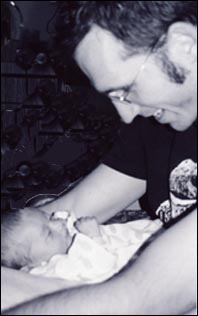
사진 31. 아빠가 좋은 눈길접촉으로 갓 태어난 아기를 사랑하면서 대화한다.
Copyright ⓒ 2011 John Sangwon Lee, MD., FAAP
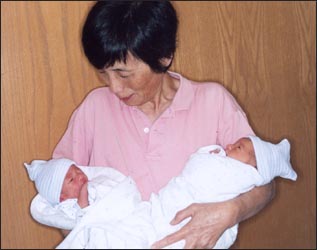
사진 30. 할머니 할아버지도 손자, 손녀에게 눈길 접촉 사랑, 신체적 접촉, 집중적 관심적 사랑을 주어 그들을 보살핀다.
경험이 많고 현명한 할머니 할아버지가 복잡하고 격동하는 이 사회에서 사는 아기엄마 아빠가 그들의 자녀들에게 다 해주지 못한 조건 없고 진정한 사랑을 그 아기의 엄마, 아빠 대신 해주면 손자, 손녀들은 더 행복하고 안정하게 자란다. 극진히 사랑하고 있는 할머니!
Copyright ⓒ 2011 John Sangwon Lee, MD., FAAP
- 알게 모르게 사람들은 자기의 분노, 증오, 노여움 등 부정적 감정을 다른 사람들에게 전달하는 의사소통 수단으로 눈길 접촉을 쓴다.
- 이와 같이, 눈길 접촉을 부정적 수단으로 쓰는 것은 큰 잘못이다.
- 부모들은 조건 없는 진정한 사랑을 자녀들에게 전달하는 수단으로 좋은 눈길 접촉사랑을 자녀들에게 많이많이 해야 한다.
- 부부관계에서 서로의 눈길 접촉이 얼마나 좋은가를 서로 알아보는 것도 좋을 것이다. 자녀들은 두 부모들 중 더 좋은 눈길 접촉으로 더 많이 사랑해주는 부모를 자연적으로 더 많이 따르기 마련이다.
- 또 학교에서도 여러 교사들 중 좋은 눈길 접촉으로 제자를 가르치는 교사들을 학생들이 더 잘 따르고 그런 교사를 학생들이 더 좋아하는 것을 의심할 바 없다.
- 직장에서도 더 좋은 눈길 접촉을 가진 상사들이나 동료들을 더 좋아하는 것도 쉽게 이해할 수 있다.
- 자녀들이 성장 발육하고 일상생활을 하는 동안 상대편을 대할 때 빛나고 총명하고 사랑스러운 눈길 접촉으로 상대자를 대해 주라고 일부러 시간을 내어 가르쳐 주는 것은 상당히 중요하다.
- 부모가 자녀를 양육할 때 꼭 한두 번 정도는 눈길 접촉을 옳게 좋게 하는 방법을 가르쳐줄 의무가 있다.
- 사실은 자녀들이 좋은 눈길 접촉을 상대방에게 확실히 할 때 까지 눈길 접촉 사랑 법을 계속 가르쳐야 한다.
- 좋은 눈길 접촉과 웃는 얼굴로 상대를 대하는 습관은 성공 여부를 결정할 수 있는 키라고 가르쳐준다.
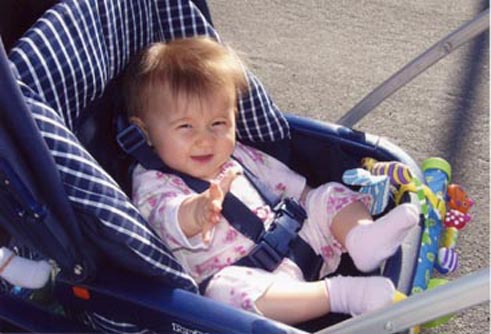
사진 32. 좋은 눈길을 가진 아이들은 인기가 있고 남들이 좋아한다. 건전한 자부심을 더 많이 갖는다. 좋은 눈길 접촉과 웃는 얼굴로 상대를 대하는 습관은 성공을 좌우할 수 있다는 것도 가르쳐준다.
Copyright ⓒ 2011 John Sangwon Lee, MD., FAAP
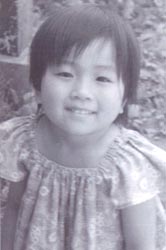
사진 33. 좋은 눈길을 가진 아이들은 인기 있고 남들이 더 좋아한다. 건전한 자부심을 더 많이 갖는다.
Copyright ⓒ 2011 John Sangwon Lee, MD., FAAP
- 타고날 때부터 좋은 눈길을 갖는 아이도 있지만 그렇지 않은 자녀가 있으면 거울 앞에 서서 좋은 눈길을 상대자에게 주는 연습을 평소에 많이 하라고 가르쳐준다.
- 경제적으로 사회적으로 정치적으로 성공한 사람들의 공통점들 중 하나는 좋은 눈길 접촉이다.
- 그런데도 많은 부모들은 좋은 눈길 접촉을 갖는 법과 그 눈길 접촉을 적절히 사용하는 법을 자녀들에게 가르쳐주지 않는다.
- 그 동안 눈길 접촉 사랑에 관해 조국 한국에서 부모들에게 여러 번 세미나를 했지만 세미나에 참석한 한인 부모들은 눈길 접촉 사랑이란 주제에 많은 관심을 갖지 않는 것 같았다.
- 심지어는 남을 똑바로 쳐다보는 것은 예의가 아니라는 말도 들었다.
- 태어나서부터 신생아기, 영유아기, 학동기, 사춘기를 거쳐 성인기로 성장하는 동안 부모로부터 좋은 눈길 접촉사랑을 많이 받고 자라는 아이들은 마음이 안정되고 평화스럽고 건전한 자부심을 갖고 생산적이고 활력이 넘치는 삶을 유지한다.
- 더 좋은 눈길 접촉사랑을 더 많이 받을수록 그런 사랑을 더 많이 받고 자라는 아이들은 또래들, 성인들, 또는 다른 사람들에게 인기가 더 많고 더 호감 간다.
- 성인이 된 이후 사회생활을 할 때도 원만하고 긍정적이고 건전하고, 또한 건전한 자부심을 더 많이 갖는다.
- 눈길 접촉의 좋은 예를 하나 들고자 한다.
- 나에게 딸 하나 아들 둘이 있다. 둘째 아들은 유펜 화학과를 졸업하고 커네티컷 의과 대학입학 면접시험을 보았다.
- 면접시험을 치르는 중 눈길을 내내 아래로 향해서 불합격 통지를 받고 그 후 눈길 접촉을 잘 이용하는 법을 배우고 다시 면접시험을 보고 합격 통지서를 받았다.
- 소아과 진료를 30여 년 동안 하는 중 어떤 소아들은 출생 후 대학 졸업할 때까지 나의 소아과를 찾아왔다.
- 나는 그들에게 눈길 접촉을 잘하는 방법도 가르쳐주었다.
- 자녀들에게 좋은 눈길 접촉사랑을 적절히 해서 그들을 양육하는 것이 얼마나 중요한지 이제 잘 알 수 있다.
- 좋은 눈길 접촉사랑을 하는 법, 많이 하는 법, 자녀들이 좋은 눈길을 갖고 상대자를 대하는 법을 가르쳐주고 자녀들도 남의 좋은 눈길을 받는 법도 자녀들에게 가르쳐주어야 한다. 이 세상에서 성공한 분들의 눈길 접촉은 일률적으로 편안함을 준다.
- 좋은 눈길을 주었던 사람들은 잊을 수 없이 항상 머릿속에 남아 있고 동경하게 된다.
- 좋은 눈길 접촉 사랑을 많이 해서 자녀들을 사랑해야 그 자녀사랑이 자녀들에게 잘 전달된다. 어린 자녀들은 가진 것이 그렇게 많지 않다.
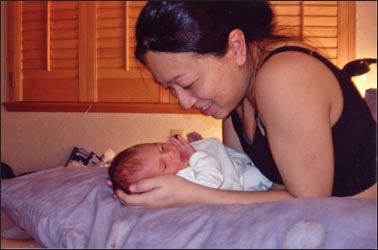
사진 34. 눈길 접촉 사랑, 신체적 접촉사랑, 집중적 관심적 사랑 그리고 사랑으로 하는 훈련을 통해 자녀들을 조건 없는 진정한 사랑을 충분히 해주면서 그들이 가지고 있는 사랑 탱크를 채워주면 그들은 행복하고 무엇을 하든 최선을 다하고 건전한 자부심을 가질 것이다.
Copyright ⓒ 2011 John Sangwon Lee, MD., FAAP
- 그 때문에 부모들로부터 얻은 눈길 접촉사랑을 그들의 사랑 탱크 속에 보관했다가 받았던 그대로 부모들에게 반사하고 다른 사람들에게도 반사한다.
- 부모들이 해준 만큼, 또 해준 방식으로 눈길 접촉사랑이 부모들에게 되돌아온다.
- 그 사회가 어린 소아청소년들에게 해준 눈길 접촉 사랑만큼, 또 해줬던 방식으로 그 사회 어린 청소년들의 눈길 접촉사랑이 그 사회에 되돌아온다.
- 눈길 접촉사랑, 신체적 접촉사랑, 집중적 관심적 사랑 그리고 사랑으로 하는 훈련을 통해 자녀들에게 조건 없는 사랑을 해주면서 그들이 가지고 있는 사랑 탱크 속을 채워주면 그들은 행복하고 무엇을 하든 최선을 다하고 건전한 자부심을 가질 것이다.
- 부모들은 자녀들에게 의, 식, 주, 건강을 충분히 제공하고 잘 교육시키면서 이 네 가지 면에다 부족함이 없이 조건 없는 진정한 사랑을 자녀들의 사랑 탱크 속에 충분히 채워주면 그 보상은 상상할 수 없이 클 것이다.
Eye contact love

Photo 27. A newborn baby receives her mother’s eye contact love and gives her own eye contact love to her mother. Source- Mead Johnson Nutritionals, USA and Encyclopedia of Pediatric and Family Nursing

Photo 28. The baby receives her eye contact love from her mother and her mother receives her eye contact love from her baby while her mother is breastfeeding her baby. In this way, as they exchange love with each other through eye contact, the bond of love between mother and child is firmly formed. Copyright ⓒ 2011 John Sangwon Lee, MD., FAAP
• There are sayings such as “eye contact, eye contact, eye contact, eye contact”.
• These words can be expressed in terms of eye contact.
• There is also a term called Eye contact love.
• You can express the word as “eye contact love”, eye contact love, eye smile love, or “eye contact love”.
• Always use your eyes when exchanging love between parents and children, between husband and wife, between friends, or between loved ones. In other words, it uses eye contact love.
• Use your eyes to communicate with each other, especially through conversation. They use eye contact a lot without realizing it.
• Also, in all other human relationships, eye contact is often used without knowing it.
• Parents can use eye contact, especially when training their children to love, and during parenting, parents use eye contact to convey unconditional and genuine love to their children.
• Parents use eye contact to properly train their children and to use eye contact as a means of conveying joy and sorrow to them in their daily lives.
• During daily life like this, eye contact between parents and children or between parents and children is often used without knowing it or not.
• Parents use each other’s eye contact a lot, especially when communicating with their children through conversation.
• After the baby is born, a mother looks at her newborn baby from head to toe with a loving gaze. • It is at this time that the newborn baby opens her eyes wide and begins to receive eye contact love from her mother.
• The baby receives her mother’s eye contact love and puts her in her love tank.
• At that very moment, her mother’s love of eye contact, which she received for the first time, is used as the nourishment and energy of the child’s life.
• Still, there are many parents who do not know how important this kind of eye contact love is. Between the loving mother and her newborn baby, the love of eye contact is given and received unknowingly.
• In other words, eye contact love between parents and children begins and continues like this.
• Watch out for babies who are breastfed.
• You can then learn how to give and receive love between mothers and mothers that cannot be found in the medical literature.
• Her suckling baby sucks her milk while staring into her mother’s eyes to get her mother’s eye contact love other than feeding her.

Photo 29. Love through eye contact while breastfeeding. Copyright ⓒ 2012 John Sangwon Lee, MD., FAAP
• Breastfed babies suck her mother’s milk and of course grow and develop with the nutrients from that milk.
• Other than that, the love of a mother’s gaze received through the mother’s gaze, and the physical contact love received from a mother while being hugged by her mother and sucking the nipple while touching the mother’s warm body, is much more important to the baby than the nutrients obtained from breast milk. it is nourishment
• A mother will not snuggle her suckling baby when the hormone oxytocin is released from her mother’s posterior pituitary gland.
• That’s why the hormone oxytocin is called the love hormone. The hormone oxytocin contracts the breast milk secretion system so that milk comes out well, and also plays a role in contracting the uterus after delivery.
• The mother’s suckling baby gets enough of her eye contact love and her physical touch love from her mother and puts that love into his love tank.
• There are more nutrients in that love than the total calories and nutrients you get from your mother’s milk.
• For this reason, mothers who breastfeed are happier, and babies who are breastfed are healthier, develop better, and are happier.
• I have read articles like this before.
• We asked medical students what are the benefits of breastfeeding. “Breast milk is the natural food.” The temperature of breast milk is consistent and suitable for the baby to eat. Breast milk is contained in the most beautiful bowl in the world, and the bowl doesn’t get crushed or broken no matter how much you rub it, so it’s really good,” answered the medical students.
• All of the above answers are correct and plausible. There are many more answers out there.
• The best advantage of breast milk is that while breastfeeding, the mother’s love for eye contact and the mother’s love for physical contact can be fully conveyed to the baby, and the baby who is breastfed there feels that she is truly loved unconditionally.
• A suckling baby doesn’t have much.
• However, the baby stores the love she receives from her mother in her love tank. • The love the baby receives from her mother while breastfeeding her baby stores her love in her own tank.
• Feeds on her mother’s milk, giving back to her mother her eye-contact and physical-touch love that she had stored in her love tank.
• Without eye contact and physical contact love from her mother, there is no love to give back to her mother.
• During breastfeeding, mother-to-child love bonding is stronger.
• Is there any other means other than this method to form a stronger bond of love between mother and child?
• It would have been better if the answer, “Love bond between mother and mother is formed during breastfeeding” must have been in the Q&A of medical students. • In many cases today, the bond of love between parents and children is weak. Sometimes the love bond isn’t even formed at all.
• There are many reasons, but the author believes that the number one reason is that mothers do not breastfeed their babies. It was also thought that she came from raising her children without breastfeeding for an adequate period of time. The reason may be that she did not properly bond between mother and mother when the baby was just born.
• “How to really love your child” and “How to really love your teenager” by Dr. Ross Campbell, pediatric psychiatrist, are my favorite parenting guides.
• In his book, he states that all children are born with an emotional tank that can store love and emotions.
• The author wants to express it as a love tank instead of an emotion tank. The term tank of emotion or tank of love is a very important word for loving and nurturing parents to know.
• The author confesses that he is writing this article using words learned from two books by Dr. Campbell.
• During daily life while raising children, parents often use eye contact love without realizing it when filling the love tank of their children or communicating with their children. In addition, physical contact love and focused attention love are often used unconsciously.
• Many parents, including authors and family members, are unaware of the importance of good eye contact and love while raising children.
• You don’t even know that how good or bad eye contact your child is can determine your child’s level of happiness, security, and success.
• And how and in what form your child makes eye contact with others has a powerful impact on his or her life in many ways.
• In other words, when exchanging and conveying affection, sympathy and love between parents and children, communicate love through smiley eye contact and communicate through good eye contact to communicate through dialogue.
• In this way, eye contact love strongly affects each person’s life either positively or negatively.
• There is a saying, “Where did the two of you go?”
• Unfortunately, some parents use eye contact as a non-verbal means of communication when communicating negative emotions such as anger, hatred, and anger to their children. • Use eye contact as body language when communicating.
• In addition, teachers with better eye contact are more popular with students and teach more effectively with good eye contact.

Picture 31. A father talks while loving his newborn baby through good eye contact. Copyright ⓒ 2011 John Sangwon Lee, MD., FAAP

Photo 30. Grandmother and grandfather take care of their grandchildren by giving them eye contact, physical contact and focused attention. If experienced and wise grandmothers and grandfathers live in this complex and turbulent society, their grandchildren and grandchildren will grow up to be happier and more stable if mothers and fathers give their children unconditional and genuine love that they cannot give their children. Grandma I love dearly! Copyright ⓒ 2011 John Sangwon Lee, MD., FAAP
• Unknowingly, people use eye contact as a means of communication to communicate their negative emotions, such as anger, hatred, and anger, to others.
• As such, it is a great mistake to use eye contact as a negative means.
• Parents should give their children a lot of good eye contact love as a means of conveying true unconditional love to their children.
• It would be good to find out how good eye contact is between husband and wife. Children are naturally more likely to follow the parent who loves them more with the better eye contact.
• Also in school, there is no doubt that students follow teachers who teach disciples with good eye contact among many teachers, and students like such teachers more.
• It’s also easy to understand that you like bosses and co-workers who have better eye contact at work.
• It is very important to deliberately take the time to teach your children to treat each other with shining, intelligent, and loving eye contact during their development and daily life.
• Parents have an obligation to teach proper eye contact at least once or twice when raising their children.
• In fact, you should keep teaching your children how to love eye contact until you make sure they make good eye contact.
• Teach them that good eye contact and smiles are the keys to success.

Picture 32. Children with good eyes are popular and liked by others. Have more healthy self-esteem. It also teaches us that good eye contact and the habit of dealing with people with a smile can determine success. Copyright ⓒ 2011 John Sangwon Lee, MD., FAAP

Photo 33. Children with good eyes are popular and preferred by others. Have more healthy self-esteem. Copyright ⓒ 2011 John Sangwon Lee, MD., FAAP
• Some children have good eyes from birth, but if there are children who do not, teach them to practice standing in front of a mirror and giving them a good look on a regular basis.
• One of the things that successful economically, socially and politically successful people have in common is good eye contact.
• Yet many parents do not teach their children how to have good eye contact and how to use it properly.
• In the meantime, there have been several seminars with parents in Korea on the topic of eye contact love, but the Korean parents who attended the seminar did not seem to pay much attention to the topic of eye contact love.
• I have even been told that it is not polite to look directly at others.
• From birth to newborn, infancy, school age, puberty, and adulthood, children who grow up with a lot of good eye contact and love from their parents maintain a stable, peaceful, healthy self-esteem, and a productive and energetic life.
• Greater Eye Contact The more love you receive, the more popular and liked by your peers, adults, or others, the children who grow up with that love.
• After becoming an adult, even in social life, they have a smooth, positive, healthy, and healthy self-esteem.
• I would like to give a good example of eye contact.
• I have a daughter and two sons. The second son graduated from UPenn’s Department of Chemistry and took the Connecticut School of Medicine entrance exam.
• During the interview, I looked down all the way to get a rejection notice. After that, I learned how to use eye contact well, took the interview again and got a passing notice.
• In my 30 years of pediatric care, some children came to my pediatrics after birth until they graduated from college.
• I also taught them how to make good eye contact.
• You now see how important it is to bring up your children with good eye contact and proper care.
• Teach your children how to make good eye contact, how to do a lot of love, how to treat others with a good eye, and how to receive good attention from others. The eye contact of successful people in this world gives uniform comfort.
• People who gave you a good glance will always remain in your mind and yearn for you.
• When you love your children by making good eye contact and loving them a lot, the love for your children is transmitted to them well. Little children don’t have that much.

Photo 34. Filling their love tanks by giving your children full unconditional true love through eye contact, physical contact, intensive caring love, and loving training, they are happy, doing their best, and healthy self-esteem. will have Copyright ⓒ 2011 John Sangwon Lee, MD., FAAP
• As a result, they store the eye contact love they get from their parents in their love tank and reflect it back to them and others as they received it.
• Eye contact love comes back to the parents as much and in the way they did.
• The love for eye contact of young people in that society returns to the society in the same way and as much as the love for eye contact that the society gave to young children.
• Give your children unconditional love through eye contact love, physical touch love, intensive caring love, and loving training, and fill their love tank, and they will be happy, do their best in whatever they do, and have a healthy sense of self-esteem.
• If parents provide their children with adequate food, food, shelter, and health, while educating them well, if they fill their children’s love tank with unconditional and true love without lacking in these four aspects, the reward will be unimaginable.
출처 및 참조 문헌 Sources and references
- NelsonTextbook of Pediatrics 22ND Ed
- The Harriet Lane Handbook 22ND Ed
- Growth and development of the children
- Red Book 32nd Ed 2021-2024
- Neonatal Resuscitation, American Academy of Pediatrics
- B형 간염 Hepatitis B
- B형 간염 예방접종 Hepatitis B immunization
- B형 간염 예방접종을 꼭 받아야 하는 사람들 Persons who should have hepatitis B immunization
- 피나 피로 만든 약을 쓸 때 B형 간염에 대한 유의할 사항 Hepatitis B Precaution for using blood or product medicine Precaution for hepatitis B vaccination
- B형 간염을 한 번도 앓은 적이 없는 사람들에게 B형 간염 예방접종을 해 주는 방법 How to give hepatitis B vaccine C형 간염/HCV 간염 Hepatitis C
- D형 간염 Hepatitis D
- E형 간염 Hepatitis E
- G형 간염 Hepatitis G
- The Johns Hopkins Hospital, The Harriet Lane Handbook, 22nd edition
- Red book 31st edition 2021
- Nelson Text Book of Pediatrics 21st Edition
- Infectious disease of children, Saul Krugman, Samuel L Katz, Ann A. Gershon, Catherine Wilfert
- Emergency Care Transportation of Sick and Injured American Academy of Orthopaedic Surgeons
- Emergency Pediatrics A Guide to Ambulatory Care, Roger M. Barkin, Peter Rosen
- Gray’s Anatomy
- Ambulatory Pediatrics, Green and Haggerty, Saunders
- Introduction to Clinical Pediatrics, Smith and Marshall, W.B. Saunders Co
- School Health: A Guide For Health Professionals, American Academy of Pediatrics
- Holly Bible
- How to really love your child Ross Campbell
- Good Behavior Stephen W. Garber, Ph.D. and other
- Kids Who follow, Kids who don’t
- Loving Each Other Leo F Buscaglia, Ph, D.
- Guide to Your Child’s Sleep. American Academy of Pediatrics
- Hematology and Oncology in Adolescence, Neil J. Grossman, M.D., Stuart S. Winter, M.D., Adolescent Medicine, and The Media Adolescents Medicine
- AM: Stars Adolescent Medicine: State of the Art Reviews, Asthma, and Diabetes in Adolescents, Robert A. Wood, M.D., Samuel J. Casella, M.D. April 2010, AAP
- AM: Stars Adolescent Medicine: State of the Art Reviews, Sleep and Sleep Disorders in Adolescents, Amy E. Sass, M.D., MPH, David W. Kaplan, M.D., MPH Editors December 2010, AAP
- The Pediatric Clinics of North America, Adolescent Gynecology, Part II THe Sexually Active Adolescent, August 1999
- The Pediatric Clinics of North America, Childhood and Adolescent Obesity, August 2001
- Adolescent Dermatology, Daniel P. Krowchuk, M.D., Anne W. Lucky, M.D., Adolescent Medicine, 12:2 June 2001
- Gastrointestinal Disorders, Jeffrey S. Hyams. M.D. Editor, Adolescent Medicine
- Fueling the Teen Machine, Ellen Shanley and Colleen Thompson
- Why Teenagers Act the Way They Do, Eight Adolescent Personality Types: Understanding and Dealing With Them, Dr. G. Keith Olson
- Adolescent Psychiatry, Adolescent Medicine Clinics, Feb. 2006 Vol 17 #1 Richard E. Kreipe, M.D., Christopher H. Hodgman, M.D.
- Adolescent and the Media, Adolescent Medicine Clinics June 2005 Vol 16 #3, Guest Editors: Victor C. Strasburger, Marjorie J. Hogan, M.D.
- 진정한 자녀 사랑 나비게이터
- 10대 아들 딸 이렇게 사랑해 키워라 이상원 역저 (How to really love your teenager. Ross Campbell MD)
- 소아과학 대한교과서
- 의학 용어사전 대한 의사 협회
- 그 외
Copyright ⓒ 2014 John Sangwon Lee, MD., FAAP
“부모도 반의사가 되어야 한다”-내용은 여러분들의 의사로부터 얻은 정보와 진료를 대신할 수 없습니다.
“The information contained in this publication should not be used as a substitute for the medical care and advice of your doctor. There may be variations in treatment that your doctor may recommend based on individual facts and circumstances.
“Parental education is the best medicine.
Copyright drleepediatrics.com 2/14/2026